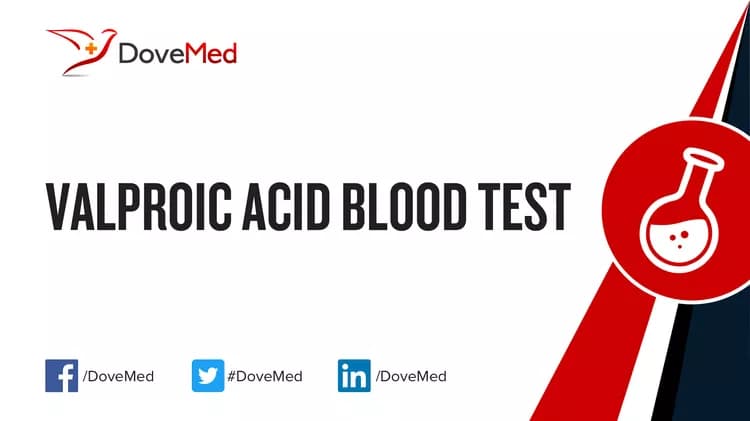What are the other Names for this Test? (Equivalent Terms)
- Dipropylacetic Acid Blood Test
- Epilim® Blood Test
- Leptilan® Blood Test
What is Valproic Acid Blood Test? (Background Information)
- Valproic acid is an anticonvulsant drug used to treat seizures. It is also used to treat bipolar disorder and other psychiatric conditions. The drug is known under the brand names of Depakene®, Depakote®, Depamide®, Epilim®, Ergenyl®, Leptilan®, and Valkote®
- Seizures are episodes of abnormal and excessive brain cell activity; they may last several seconds to even 5 minutes. Often, the cause of a seizure is unknown. A seizure may occur as result of a nervous system disorder, called epilepsy. They may also occur following a brain surgery
- During a seizure, an individual may convulse or display other uncontrolled physical behaviors. Such seizures are said to be convulsive and convulsive seizures are the most common seizures
- Alternatively, non-convulsive seizures do not exhibit this uncontrolled physical behavior. Instead, an individual experiencing this seizure type may momentarily lapse out of consciousness, effectively “zoning out”
- Brain cells communicate to each other and to other cells, through electrical signals. During a seizure, brain cells are rendered excessively conductive. The brain cells that are over-conductive transfer electrical signals too freely. This results in the derailment of their communications system, causing either convulsive or non-convulsive effects of seizures
- The drug valproic acid dampens the activities of brain cells. It works by reducing the sky-high conductivity of brain cells to more functional levels. This is also how valproic acid works to treat bipolar disorder and other psychiatric conditions
- Like every other drug, valproic acid must be kept within a certain range, in order to prevent certain unwanted effects. If levels are too high, it may result in toxicity. If the levels are too low, the drug may not successfully ward-off a seizure attack
- The Valproic Acid Blood Test is a test to assess the levels of valproic acid in blood. It is used when adjusting the initial dose and to ensure that valproic acid levels stay within an acceptable range
What are the Clinical Indications for performing the Valproic Acid Blood Test?
A Valproic Acid Blood Test is performed to monitor valproic acid therapy.
How is the Specimen Collected for Valproic Acid Blood Test?
Following is the specimen collection process for Valproic Acid Blood Test:
Sample required: Blood
Process: Insertion of a needle into an arm vein.
Preparation required: No special preparation is needed prior to the test.
What is the Significance of the Valproic Acid Blood Test Result?
The significance of the Valproic Acid Blood Test is explained:
- Excessive valproic acid levels may indicate valproic acid toxicity, which is marked by:
- Respiratory depression
- Stupor
- Coma
- Low valproic acid levels may indicate that more valproic acid is necessary to achieve a therapeutic dose
The laboratory test results are NOT to be interpreted as results of a "stand-alone" test. The test results have to be interpreted after correlating with suitable clinical findings and additional supplemental tests/information. Your healthcare providers will explain the meaning of your tests results in the context of the overall clinical scenario.
Additional and Relevant Useful Information:
- Valproic acid is a known teratogen, which means that it may cause birth defects and other abnormalities. Extreme caution is advised, while administering valproic acid drug during pregnancy
Certain medications that you may be currently taking may influence the outcome of the test. Hence, it is important to inform your healthcare provider, the complete list of medications (including any herbal supplements) you are currently taking. This will help the healthcare provider interpret your test results more accurately and avoid unnecessary chances of a misdiagnosis.
Related Articles
Test Your Knowledge
Asked by users
Related Centers
Related Specialties
Related Physicians
Related Procedures
Related Resources
Join DoveHubs
and connect with fellow professionals


0 Comments
Please log in to post a comment.